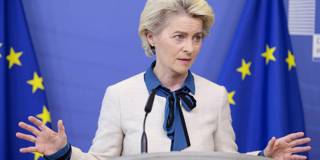Although these are not auspicious times for multilateralism, that is no excuse for Europe's climate-oriented investments, diplomacy, and international aid to fall by the wayside. If anything, a climate-focused strategy can serve all of the bloc's primary objectives simultaneously.
PARIS – Russia’s war on Ukraine reveals a new dynamic of non-alignment in the international system. Western leaders find themselves more isolated on the global stage than they expected. When the United Nations General Assembly (UNGA) has taken votes to condemn Russia’s aggression, China and many others have abstained or opposed them. Major democracies like Brazil, Indonesia, India, Senegal, and South Africa have hedged their positions on the war. And by hosting and sending high-level delegations, Russia has been competing with the European Union and the United States for influence in various regional blocs, intensively courting members of the African Union and the Association of Southeast Asian Nations.
Why are so many countries wary of taking sides, even after seeing the unspeakable suffering Russia has inflicted on civilians in Ukraine?
Part of the reason is a widespread perception of European double standards (Ukraine is hardly the only conflict zone in the world today) and Europe’s uneven diplomacy on issues such as COVID-19 vaccines, debt relief, migration, and climate financing. Moreover, many fear alienating Russia, given the vast leverage that it has over energy and commodity prices.

PARIS – Russia’s war on Ukraine reveals a new dynamic of non-alignment in the international system. Western leaders find themselves more isolated on the global stage than they expected. When the United Nations General Assembly (UNGA) has taken votes to condemn Russia’s aggression, China and many others have abstained or opposed them. Major democracies like Brazil, Indonesia, India, Senegal, and South Africa have hedged their positions on the war. And by hosting and sending high-level delegations, Russia has been competing with the European Union and the United States for influence in various regional blocs, intensively courting members of the African Union and the Association of Southeast Asian Nations.
Why are so many countries wary of taking sides, even after seeing the unspeakable suffering Russia has inflicted on civilians in Ukraine?
Part of the reason is a widespread perception of European double standards (Ukraine is hardly the only conflict zone in the world today) and Europe’s uneven diplomacy on issues such as COVID-19 vaccines, debt relief, migration, and climate financing. Moreover, many fear alienating Russia, given the vast leverage that it has over energy and commodity prices.